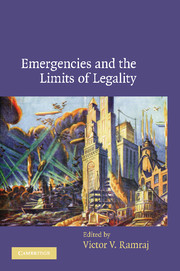Book contents
- Frontmatter
- Contents
- List of contributors
- Preface
- Introduction
- 1 No doctrine more pernicious? Emergencies and the limits of legality
- PART ONE Legality and extra-legality
- PART TWO Conceptual and normative theories
- PART THREE Political and sociological theories
- PART FOUR Prospective constraints on state power
- PART FIVE Judicial responses to official disobedience
- PART SIX Post-colonial and international perspectives
- Index
- References
1 - No doctrine more pernicious? Emergencies and the limits of legality
Published online by Cambridge University Press: 10 August 2009
- Frontmatter
- Contents
- List of contributors
- Preface
- Introduction
- 1 No doctrine more pernicious? Emergencies and the limits of legality
- PART ONE Legality and extra-legality
- PART TWO Conceptual and normative theories
- PART THREE Political and sociological theories
- PART FOUR Prospective constraints on state power
- PART FIVE Judicial responses to official disobedience
- PART SIX Post-colonial and international perspectives
- Index
- References
Summary
Introduction
Most modern states turn swiftly to law in times of emergency. The global response to the 11 September 2001 (9/11) attacks on the United States was no exception and the wave of legislative responses, encouraged by the United Nations Security Council (UNSC) through its Counter-Terrorism Committee, is well-documented. Yet there is an ever-present danger, borne out by historical and contemporary events, that even the most well-meaning executive, armed with emergency powers, will abuse them. And this inevitably leads to another common tendency in an emergency: to invoke law not only to empower the state, but also in a bid to constrain it. This volume explores law's capacity to do so.
Those who are interested in the use of law solely as an instrument of counter-terrorism policy might be inclined at this stage to put this volume promptly back on the shelf. But there are good reasons not to. For one, even in appropriating law as an instrument of counter-terrorism power, states commit to governing through law – and thus commit, in some fashion, to the principle of legality. Understanding the implications of this commitment is one of the primary objectives of this volume. Of course, the concept of legality (which is used in this volume interchangeably with the ‘rule of law’) is itself contentious.
- Type
- Chapter
- Information
- Emergencies and the Limits of Legality , pp. 3 - 30Publisher: Cambridge University PressPrint publication year: 2008
References
- 7
- Cited by



